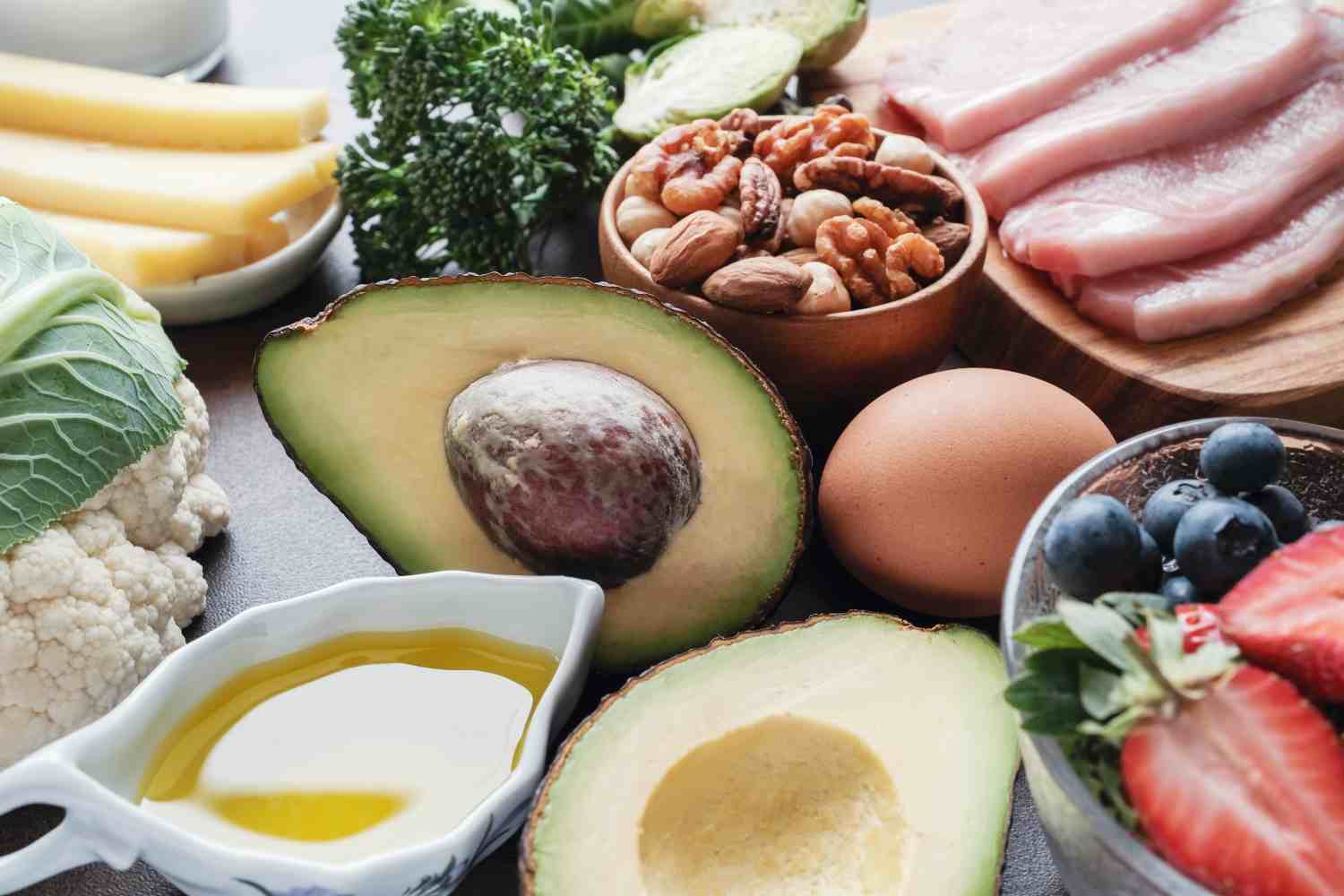12 Benefits of the Keto Diet and How Does it Work?

Following a keto diet is one effective way to shed extra pounds. The weight loss rate differs for each person and mostly depends on one’s health condition, lifestyle, fat adaptation period, and body composition. Hence, individuals should learn about the basics before starting a keto diet.
The following section discusses the keto diet's effectiveness, benefits, and other aspects:

Table of Contents

What is the Keto Diet?
A ketogenic or keto diet is a low-carbohydrate, fat-rich diet plan that aims to get more calories from fat and protein instead of carbohydrates.
This eating plan shares many similarities with Atkins and other low-carb diets. However, a keto diet involves deficient carbohydrate intake and replacing it with fat. Through this dietary plan, one’s body enters into a metabolic state called ketosis.
Now, what is ketosis?
Usually, body cells rely on glucose as their primary source of energy. When on a keto diet, the supply of glucose or carbohydrates is reduced, which forces the body to rely on alternative sources of energy, i.e., fat. In ketosis, fat turns into ketones, by-products of metabolism, in the liver that can efficiently supply energy to the brain.
How to Start a Keto Diet?
Starting a keto diet involves gradually reducing carbohydrate intake while increasing fats to shift your body into ketosis. This metabolic change requires careful planning to ensure nutritional balance and sustain energy levels throughout the transition.
Steps to Begin a Keto Diet:
- Decrease Carbohydrates Slowly: Begin by lowering the amount of carbohydrates you consume daily, keeping your aim at 20-50 grams daily. This will allow the body to adapt to using fats as its primary energy source.
- Raise Healthy Fats: Eat healthier fats, such as avocado, olive oil, and nuts, to meet your energy requirements and boost ketone production.
- Moderate Protein Consumption: Consume moderate protein amounts, such as lean meats and eggs, to maintain muscle mass without interfering with ketosis.
- High Hydration Levels: Drink plenty of water and consider adding electrolytes so you do not become dehydrated or suffer from common starting keto diet side effects like headaches and muscular cramps.
- Monitor Your Macros: Use a food diary or mobile app to note down what you eat daily regarding carbs, fat, or proteins so that your intake is within your target range for effective ketosis.
- Plan Meals: Prepare a weekly meal plan consisting of ketogenic recipes, snacks, a grocery list, etc. This will make it easier to maintain discipline in eating habits and avoid high-carbohydrate temptations.
Is a Keto Diet Effective?
Keto diets help individuals lose weight, preserve muscle mass, and enhance many disease markers. Further, this dietary plan works more efficiently than a low-fat diet, even if the total calorie intake remains the same.
Another study shows that individuals on a keto diet reduced 2.2 times more weight than those on a low-fat diet. Here, the Triglyceride and good cholesterol levels (HDL) also improved. Therefore, the group practising increased calorie intake experienced more significant weight loss.
12 Benefits of Doing Keto Diet

Adopting a keto diet offers multiple health advantages beyond weight loss, including improved metabolic health, reduced inflammation, and enhanced cognitive function. Understanding these benefits can help individuals make informed decisions about incorporating this dietary approach into their lifestyle.
Besides knowing what a keto diet is, individuals must learn about its benefits. Read along!
1. Reduces Weight
One of the prime benefits of the keto diet is quick weight loss. This dietary plan boosts metabolism and reduces appetite. The food items included in the ketogenic diet reduce hunger-stimulating hormones, thus supporting weight loss.
According to a 2013 meta-analysis, among 13 different randomised controlled trials (RCT), individuals on the keto diet lost almost 1 kg more than those on a low-fat diet for over a year.
2. Fights Acne
Eating refined carbohydrates can balance gut bacteria levels and lead to blood sugar fluctuation. These can affect skin health adversely. However, opting for a low-carbohydrate and high-fat keto diet can help individuals reduce acne-related symptoms.
3. Reduces Risk of Cancers
Apart from reducing weight, a ketogenic diet helps prevent and treat certain types of cancers. Research shows that cancer patients can go on a keto diet as a complementary treatment besides chemotherapy and radiation therapy. This dietary plan causes oxidative stress in cancer cells, causing them to die.
4. Improves Heart Health
A ketogenic diet is beneficial in improving heart health. Individuals who went on the keto diet had been able to reduce cholesterol levels significantly, such as low-density lipoprotein (LDL) and increase high-density lipoprotein (HDL) or “good” cholesterol levels. As the keto diet helps to reduce cholesterol, it can help to prevent risks associated with heart health.
5. Treats PCOS Symptoms
PCOS (Polycystic Ovary Syndrome) refers to a medical condition that leads to ovulatory dysfunction, polycystic ovary, and excessive production of male hormones.
6. Protects Brain Function
According to PubMed Central, ketones generated as a result of the keto diet can provide the body with neuroprotective benefits that help strengthen and protect brain and nerve cells. Therefore, the keto diet can help individuals combat conditions like Alzheimer’s disease.
7. Reduces Seizures
According to a study by the Epilepsy Foundation, ketones generated during ketosis help reduce seizures, particularly in persons with epilepsy. Another research by the NCBI stresses a hypothesis that a ketogenic diet can help reduce the symptoms of epilepsy.
8. Increased Levels of HDL Cholesterol
One of the effective ways to increase HDL or “good” cholesterol is to eat fat-rich foods. Since the keto diet includes low carbohydrate and fat-rich food items, it can lead to high blood HDL levels.
9. Lowers Blood Pressure
High blood pressure or hypertension can result in severe diseases such as heart diseases, kidney failure, and stroke. Diets comprising low-carbohydrate food items lessen the risk of having these diseases.
It is clear from the above discourse what a keto diet is and its benefits. Now let us focus on how the keto diet works.
10. Supports Mental Health
By stabilising blood sugar levels and reducing insulin spikes, the keto diet may help alleviate symptoms of mood disorders such as depression and anxiety. This stabilisation contributes to more consistent energy levels and improved mental clarity.
11. Enhances Physical Endurance
As the body becomes efficient at burning fat for fuel, endurance athletes on a keto diet may experience improved stamina and sustained energy during prolonged physical activities. This adaptation supports better performance in activities like long-distance running and cycling.
12. Improves Digestive Health
The keto diet can promote a healthier gut microbiome by reducing the intake of refined carbs and sugars. This dietary change may alleviate symptoms of digestive disorders such as irritable bowel syndrome (IBS) and contribute to overall digestive health.
The above discourse clearly explains the keto diet and its benefits. Now, let's focus on how the keto diet works.
How Does the Keto Diet Work?
The primary goal of a ketogenic diet is to deprive the body of its primary energy source, i.e., glucose, which can be obtained from carbohydrate-rich food items. However, the human brain needs a constant supply of glucose, at least 120 grams daily, because it cannot store it. Therefore, keto diets use alternative sources, such as foods with high-fat levels.
As the supply of glucose is reduced during the keto diet, the body utilises stored glucose from the liver and breaks down muscles to free up glucose. When the body functions like this for 3-4 days, it uses fat as its primary energy source. In this dietary plan, the liver produces ketone, which helps continue bodily functions even without glucose.
Foods You Can Eat on the Keto Diet

There can be different types of keto diets. Individuals need to select one that suits them and follow the diet. The list of food items that the keto diet includes is mentioned below -
|
Food Group |
Food Items |
|
Protein |
Meat - [Grass-fed beef, Dark meat chicken, Ham, Sausage, Turkey, Steak] Fish - [Salmon, Tuna, Mackerel, Trout] |
|
Fruits and Vegetables |
Avocado, Celery, Leafy greens such as arugula and spinach, Leeks, Eggplant, Asparagus, Spaghetti squash |
|
Dairy Products |
Blue cheese, Feta cheese Full-fat cottage cheese, Cheddar cheese, Full-fat plain, Greek yoghurt, Full-fat ricotta cheese |
|
Nuts and Seeds |
Almonds, Walnuts, Unsweetened nut butter (peanut or almond butter), Flaxseed and chia seed, Pistachios, Cashews |
|
Condiments and Sauces |
Lemon butter sauce, Mayonnaise (no added sugar), Guacamole, Tomato sauce (no added sugar), Balsamic vinegar, Raw garlic |
|
Sweeteners (Occasionally) |
Stevia, Xylitol, Erythritol |
|
Herbs and Spices |
All herbs, Salt, Thyme, Oregano, Cayenne Pepper, Onion powder, Garlic powder, Ground ginger |
|
Supplements (Consider taking) |
Multivitamin, Fibre, Exogenous ketones, MCT oils |
What to Drink on a Keto Diet?

Selecting the suitable beverages is essential on a keto diet to maintain ketosis and stay hydrated. Opt for drinks low in carbs and sugars while ensuring they complement your nutritional goals and support electrolyte balance.
Drink Group |
Beverages |
| Tea | Unsweetened black tea, Green tea, Herbal tea |
| Coffee | Black coffee, Bulletproof coffee |
| Electrolyte Drinks | Electrolyte water, Low-carb electrolyte drinks |
| Dairy & Dairy Alternatives | Unsweetened almond milk, Coconut milk, Full-fat dairy (e.g., heavy cream) |
| Low-Carb Alcohol | Dry wine, Light beer, Spirits (e.g., vodka, gin) |
Exercises for the Keto Diet

Combining a keto diet with regular exercise can enhance fat loss and improve overall fitness. Focus on activities that align with your energy levels while supporting muscle preservation and cardiovascular health. Some practical exercises include:
- Low-Intensity Steady-State Cardio (LISS): Engage in activities like walking, cycling, or swimming steadily for at least 30 minutes to promote fat burning without exhausting glycogen stores.
- Strength Training: Incorporate resistance exercises such as weight lifting, bodyweight workouts, or resistance band exercises to build and maintain muscle mass while following a low-carb diet.
- High-Intensity Interval Training (HIIT): Perform short bursts of intense exercise followed by rest or low-intensity periods, such as sprinting or jumping rope, to boost metabolism and enhance fat loss.
- Flexibility and Balance Exercises: Practice yoga, pilates, or stretching routines to improve flexibility, balance, and recovery. These exercises complement the strength and endurance aspects of your exercise regime.
- Endurance Training: Engage in longer-duration exercises like jogging or rowing to increase stamina and cardiovascular health, adjusting intensity based on your adaptation to ketosis.
What Should I Avoid on a Keto Diet?

Avoiding certain foods and drinks is crucial for maintaining ketosis and achieving the desired benefits of a keto diet. Steering clear of high-carb and sugar-laden items will help you stay on track and prevent disruptions in your metabolic state. Below is a list to focus on:
- High-Carbohydrate Foods: Avoid grains such as wheat, rice, oats, pasta, bread, and cereals, as they contain high levels of carbohydrates that can prevent ketosis.
- Sugary Foods and Drinks: To minimise carb intake and blood sugar spikes, avoid sweets like candies, cakes, pastries, sodas, fruit juices, and any foods with added sugars.
- Starchy Vegetables: Limit consumption of potatoes, corn, peas, and carrots, which are high in starch and can increase carb intake.
- Legumes and Pulses: Exclude beans, lentils, chickpeas, and other legumes from your diet, as they are rich in carbohydrates and may interfere with ketosis.
- Certain Fruits: Reduce or eliminate fruits high in natural sugars, such as bananas, apples, grapes, and mangoes, opting instead for low-carb fruits like berries in moderation.
Who Should Opt for Keto Diet?
The keto diet can be particularly beneficial for individuals dealing with specific health conditions or challenges. This dietary approach, which emphasises low-carbohydrate and high-fat intake, can support metabolic health and improve symptoms for those facing particular issues
- Body Mass Index Over 40: For individuals with a BMI over 40, the keto diet can aid in significant weight reduction and improve obesity-related health conditions by promoting fat loss over muscle loss.
- Insulin Resistance Without Type 2 Diabetes: People with insulin resistance but not type 2 diabetes may benefit from a keto diet as it can enhance insulin sensitivity and help manage blood sugar levels.
- Alzheimer’s Disease: The keto diet may benefit those with Alzheimer’s by providing an alternative energy source to glucose, potentially improving cognitive function and reducing symptoms.
- Brain Cancer: For some brain cancer patients, the keto diet can be used as an adjunct therapy, potentially slowing tumour growth by depriving cancer cells of glucose.
- Autism: In individuals with autism, the keto diet might help by stabilising brain energy supply and reducing neurological symptoms, though evidence is still emerging and varies by case.
Who Should Not Opt for Keto Diet?
While the keto diet can offer various health benefits, it is not suitable for everyone. Individuals with certain medical conditions should avoid this dietary approach to prevent potential health complications.
However, you must avoid such a diet if you have any of the following health conditions:
- Kidney Damage: People with kidney damage should avoid the keto diet, as the high protein intake can exacerbate kidney issues and lead to further complications.
- Heart Diseases: Those with heart diseases may be at risk since the diet's high fat content can negatively impact cardiovascular health if not properly managed.
- Type 1 Diabetes: Individuals with type 1 diabetes should steer clear of the keto diet due to the risk of diabetic ketoacidosis, a dangerous condition resulting from high ketone levels.
- Underwent Gallbladder Removal: After gallbladder removal, the body may struggle to process high-fat foods, making the keto diet unsuitable and potentially causing digestive problems.
- Pre-Existing Liver or Pancreatic Conditions: The keto diet can strain the liver and pancreas, worsening pre-existing conditions and leading to severe health issues.
- Pyruvate Kinase Deficiency: People with pyruvate kinase deficiency should avoid keto since their bodies cannot properly metabolise ketones, leading to energy production issues.
- Pregnant or Nursing Women: Pregnant or nursing women should not follow the keto diet as it can deprive them of essential nutrients required for fetal development and lactation.
- Porphyrias: Individuals with porphyrias, a group of disorders affecting the nervous system, should avoid the keto diet because it can trigger symptoms due to its high fat and low carbohydrate content.
- Carnitine Deficiency: Those with carnitine deficiency should not opt for keto, as their bodies may struggle to transport fatty acids into cells for energy production, leading to muscle weakness and other issues.
Side Effects and Risk Factors of Following a Keto Diet

A keto diet can have short-term and long-term side effects, along with other risk factors. While the diet is effective for many, understanding its potential drawbacks is crucial for maintaining health and safety over time.
The short-term side effects of a keto diet include –
Low blood sugar or hypoglycaemia
Constipation
Smelly breath
Disturbed sleep
Frequent urination
Hunger
Excessive thirst
Sweating and chills
Dehydration
Headaches
Dizziness
Muscle cramps
Irritability
Tachycardia
Shakiness
A keto diet, if continued for an extended period, can impact the human body adversely. Further, the side effects vary across age groups. Read on to know the long-term side effects of this diet plan.
Long-term side effects of the keto diet in children –
Kidney stones or nephrolithiasis.
Increased risk of bone fracture
Long-term side effects of the keto diet in adults –
Increased levels of cholesterol and triglycerides
Amenorrhea
Disruption in the menstrual cycle
Now that individuals know what a keto diet is, its effectiveness, benefits, and side effects, they can plan their diet accordingly to get the desired results.
In conclusion, the ketogenic diet offers a unique approach to weight loss and potentially holds benefits for managing certain health conditions. However, its restrictive nature and potential side effects necessitate careful consideration and guidance from a healthcare professional.













